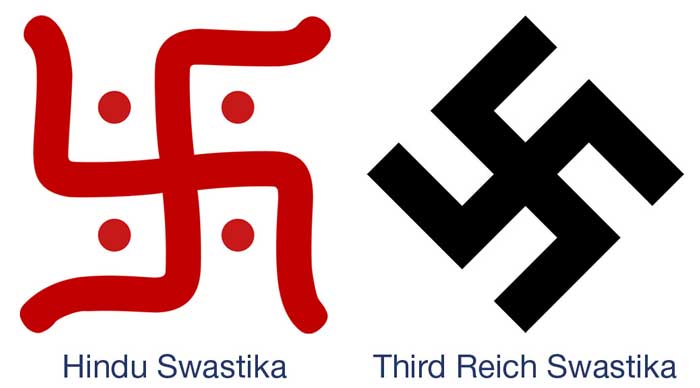
The swastika is one of the oldest known symbols of humankind. This symbolic icon is widely known in most of the countries of the world and has an important place in human history. A swastika, which almost looks like an improvised wheel, is a symmetrical rotational arrangement with four equally spaced legs of identical length, each bent at right angles in a uniform direction to create a symmetrical pattern like a four-armed spiral. It was found in the archeological remains of the Indus Valley Civilization and Mesopotamia, as well as in early Byzantine and Christian artwork.

In Hinduism, ‘Swastika’, the clockwise icon, is considered as the symbol of ‘Surya’, the Sun God, prosperity, and good luck, while the counterclockwise symbol, called ‘Sauvastika’ represents the ‘Night’ or Tantric aspects of the goddess Kali. In Buddhism it symbolizes the auspicious footprints of Lord Buddha, while in Jainism, a Swastika is the symbol for ‘Suparshvanatha’, the 7th of 24 Tirthankaras, the holy spiritual teachers. It is also widely used by Native American tribes.

The word ‘Swastika’ has been used in English since the 1870s, replacing the original word ‘gammadion’. However, the word is derived from the Sanskrit root ‘Swasti’, which is composed of ‘Su’, meaning "good, well", and ‘Asti’ meaning "it is, there is". Hence, the word ‘Swasti’, means, ‘May good prevail, well, good, auspicious, luck, success, prosperity’. The word can be found frequently in the Vedas. Swastika connotes a form of welcome or a sign of something ‘associated with well-being’. In the ancient Indian texts, the base word ‘Swasti’ is equivalent to "may it be well with thee’. Considered by a majority of scholars as a solar symbol, the sign implies something fortunate, lucky or auspicious.

In the Western world, the swastika was historically a symbol of auspiciousness and good luck. However, in the 1930s, as it was adopted by the Nazi Party, it became the symbol of German nationalistic pride and an emblem of Aryan race identity. Consequently, it became a symbol of anti-Semitism and terror. Even today, it is viewed by many Western Countries as a symbol racism, hatred and mass murder.
